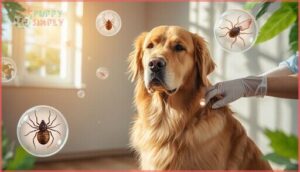This site is supported by our readers. We may earn a commission, at no cost to you, if you purchase through links.
When your dog limps after a long hike or your cat develops a persistent skin infection, you’re witnessing the same biological challenges that have plagued animals throughout history—but with one vital difference. Today’s veterinary pharmacology offers targeted solutions that would have seemed like science fiction just a generation ago, from monoclonal antibodies that halt allergic cascades to gene therapies that address inherited disorders at their molecular roots.
Animal medicines encompass far more than the familiar pill bottles in your veterinarian’s cabinet; they represent a complex intersection of species-specific metabolism, pharmaceutical innovation, and regulatory oversight designed to protect both your pet’s welfare and public health.
Understanding how these therapeutic agents work, when they’re necessary, and how to use them responsibly can mean the difference between watching your companion struggle and seeing them thrive.
Table Of Contents
- Key Takeaways
- What Are Animal Medicines?
- Major Types of Animal Medicines
- Common Animal Medicines and Their Uses
- Trends and Innovations in Animal Medicines
- Safety, Regulation, and Responsible Use
- Frequently Asked Questions (FAQs)
- What is the approval process for new animal medicines?
- How are animal medicines regulated?
- What is the role of veterinarians in prescribing animal medicines?
- How can I safely store and dispose of animal medicines?
- Are there any potential side effects of animal medicines?
- How much does veterinary medication typically cost?
- Can I give my pet expired medicine?
- Where can I purchase animal medicines legally?
- Do pet insurance plans cover prescription medications?
- How should I store veterinary medicines at home?
- Conclusion
Key Takeaways
- Modern veterinary medicines go far beyond basic antibiotics to include monoclonal antibodies, gene therapies, and personalized treatments based on your pet’s genetic profile, with approval processes averaging 6.5 years for companion animals to ensure rigorous safety standards.
- You can’t simply adjust human medication doses for animals because toxicity profiles and metabolic pathways vary dramatically across species, making species-specific formulations and veterinary oversight essential for safe treatment.
- Antimicrobial resistance poses a serious threat to both animal and human health, requiring responsible antibiotic use through evidence-based diagnosis, proper dosing adherence, and exploration of alternatives like vaccines and enhanced biosecurity measures.
- Your role extends beyond giving medications as prescribed—monitoring your pet for side effects, maintaining proper storage conditions, reporting adverse reactions, and communicating changes to your veterinarian are critical components of effective treatment outcomes.
What Are Animal Medicines?
Animal medicines are specialized therapeutic agents designed to prevent, diagnose, and treat diseases across different species, from household pets to livestock and exotic animals. These products play a critical role in maintaining animal welfare, improving quality of life, and supporting the productivity of food-producing animals.
While some medications overlap with human medicine, veterinary pharmaceuticals are formulated with species-specific considerations that account for unique metabolic pathways, dosing requirements, and safety profiles.
Definition and Purpose
Animal medicines are veterinary drugs designed to diagnose, treat, prevent, or manage diseases in pets and livestock. These animal pharmaceuticals include antibiotics, vaccines, and parasiticides, each formulated specifically for different species’ unique metabolic needs.
You’ll find these medication types essential for pet wellness, supporting everything from disease prevention to pain relief, ultimately safeguarding both animal health and public safety through proper veterinary care and responsible veterinary medicine practices. The use of animal health medicines is critical in maintaining the well-being of pets and livestock.
Importance for Animal Health
Your companion’s well-being depends on veterinary medicine to prevent diseases like rabies and distemper while extending their lifespan through treatment of infections, chronic conditions, and pain. Pet wellness relies on animal health interventions that reduce mortality and improve quality of life, addressing everything from diabetes to age-related diseases.
These health benefits extend beyond pet medications—livestock health depends on disease prevention, protecting both animal welfare and your family’s food security through proper veterinary care.
The role of veterinarians in ensuring public health safety is vital for preventing zoonotic diseases.
Differences From Human Medicines
While veterinary medicine shares common ground with human medicine through overlapping medications like antibiotics and corticosteroids, formulation variations and species pharmacokinetics create critical differences.
You can’t simply adjust dosages—toxicity profiles vary dramatically across species, and regulatory standards mandate food safety assessments for livestock.
Animal medicines require species-specific dosing because toxicity profiles vary dramatically across different species
Collaboration between veterinary and human medicine fosters progress, but dosing differences require species-specific evaluation to guarantee your animal’s safety.
Major Types of Animal Medicines
When you walk into a veterinary clinic or browse products for your animals, you’ll quickly realize that animal medicines come in several distinct categories, each designed to address specific health needs. Understanding these major types helps you make informed decisions about your pet’s or livestock’s care.
Let’s look at the primary categories of veterinary medicines and what they’re used for.
Pharmaceuticals (Antibiotics, Analgesics, Antifungals)
Pharmaceuticals form the backbone of modern pet health care, addressing everything from bacterial infections to chronic pain. When your dog needs antibiotics for a skin infection, you’re relying on medication safety protocols refined over decades.
Analgesics provide essential pain management after surgery, usually at veterinary dosage ranges of 1-4.4 mg/kg daily.
Antifungals combat fungal infections, though growing antibiotic resistance demands careful, monitored use of all pharmaceuticals.
Biologics (Vaccines, Immunotherapies)
Vaccines and immunotherapies represent your pet’s first line of defense against serious diseases. The VANGUARD crLyme vaccine, for instance, demonstrated 93.7% efficacy in preventing Lyme disease infection during clinical trials.
Beyond traditional disease prevention, advanced biological products like monoclonal antibodies now target therapeutic challenges from osteoarthritis to cancer, while biotechnological advances continue expanding treatment possibilities through gene therapies and recombinant DNA platforms.
Parasiticides (Flea, Tick, and Worm Treatments)
Your pet’s comfort depends on effective parasite control. Parasiticides target fleas, ticks, and internal worms through monthly topicals or injectable treatments that can provide up to one year of pet protection. While these medications achieve over 99% efficacy in flea prevention and tick removal, you’ll want to discuss potential side effects with your veterinarian.
Heartworm prevention and exotic animal care require species-specific formulations for maximum worm medication safety.
Feed Additives and Medicated Feeds
Agriculture’s backbone includes a diverse array of feed additives and medicated feeds that improve animal growth, feed efficiency, and overall health. When you care for livestock or production animals, you’re working with veterinary products that deliver nutrient supplements directly through daily meals.
These animal health products support livestock care by:
- Enhancing feed efficiency while reducing environmental impact
- Providing medicated premixes to prevent bacterial infections and parasites
- Strengthening immunity and digestive function in growing animals
- Delivering therapeutic treatments for disease control
Diagnostic Tools and Kits
You can’t treat what you can’t identify—that’s where diagnostic tools and kits become essential veterinary products. Rapid test kits detect diseases like parvovirus within minutes, while veterinary ultrasound and diagnostic imaging reveal internal conditions.
Lab analyzers process bloodwork efficiently, and medical sensors monitor critical signs. These animal drugs and diagnostic tools enable accurate disease diagnosis, helping you make informed treatment decisions faster.
Common Animal Medicines and Their Uses
When you step into a veterinary clinic or browse online pet pharmacies, you’ll encounter dozens of medications designed to treat everything from arthritis to allergies. Some have become household names among pet owners, while others serve specialized roles in livestock health or care for less common companion animals.
Let’s look at the medications you’re most likely to come across and what conditions they’re used to treat.
Popular Medications for Pets (Adequan, Apoquel, Amoxicillin)
When your dog’s scratching keeps everyone up at night or joint stiffness slows their morning walks, three medications often come to the rescue. Apoquel targets animal allergies and itching, proving effective in roughly 50% of cases while supporting pet skin health.
Adequan injections improve canine arthritis mobility by 19% on average.
Amoxicillin, accounting for half of veterinary antibiotics prescribed, remains the go-to for bacterial infections requiring pet pain relief.
Livestock Medicines and Preventative Care
If you’re raising cattle, pigs, or poultry, proactive livestock vaccination and farm biosecurity measures can reduce antibiotic dependency by up to 70%. Disease prevention starts with fundamentals your animals count on daily:
- Routine health monitoring paired with strategic parasiticides like ivermectin for parasite control
- Clean water systems preventing disease outbreaks before they start
- Balanced animal nutrition supporting immune function naturally
- Biosecurity protocols limiting pathogen exposure across your operation
- Targeted antiparasitics during emergency situations only
Preventative veterinary medicine keeps your herd productive while cutting treatment costs.
Medicines for Exotic and Companion Animals
Your parrot, bearded dragon, or rabbit needs species-specific medicines that standard pet health and wellness products don’t address. Compounded medications fashioned for exotic species fill critical gaps when FDA-approved animal drugs aren’t suitable.
For instance, your guinea pig might need cisapride suspension for gastrointestinal issues, while your bird receives polyoma virus vaccination.
Exotic pet care relies on veterinary research into dose scaling and formulation adjustments, ensuring your companion’s unique physiology receives appropriate therapeutic support through carefully fashioned veterinary medications.
Pain Management and Allergy Treatments
Whether your dog suffers from arthritis or your cat battles seasonal allergies, veterinary care offers targeted pain relief through NSAIDs like Carprofen and Meloxicam. Antihistamines, corticosteroids, and newer medications such as Apoquel address inflammatory responses effectively.
Pain management increasingly combines gabapentin or tramadol with traditional therapies, while allergy shots provide long-term relief. These pet therapies, when properly administered, markedly improve your companion’s quality of life.
Trends and Innovations in Animal Medicines
The field of animal medicine is advancing faster than ever, with breakthroughs that mirror developments in human healthcare and some that are uniquely adapted to our animals’ needs. You’ll find innovations ranging from advanced biologics to treatment approaches individualized for specific pets.
Here’s what’s shaping the future direction of how we care for and treat animals.
Overlapping Medications With Human Medicine
Many treatments you recognize from your own medicine cabinet now serve double duty in veterinary care through cross-species therapy. This shared pharmacology reflects the One Health approach to healthcare, where collaboration between veterinary and human medicine strengthens both fields while addressing the human-animal interface.
Common overlapping drug classes include:
- Antibiotics like amoxicillin and cephalosporins treat bacterial infections across species.
- Analgesics, including certain NSAIDs, manage pain through similar veterinary pharmacokinetics.
- Antifungals such as fluconazole combat fungal infections effectively.
However, this use of drugs in animals and humans raises drug resistance concerns. Drug safety and monitoring remain essential, as roughly 46% of veterinarians routinely prescribe human medications for pets.
Biotechnological Advances (Monoclonal Antibodies, Gene Therapies)
Veterinary biotech is revolutionizing treatment through monoclonal therapy and gene editing. Elanco’s monoclonal antibody treatment achieved a notable 93% survival rate in puppies with parvovirus, reducing hospital stays by nearly two days. Gene editing technologies like CRISPR now correct genetic defects in animals, with over 50 clinical trial sites advancing animal genomics. These biologics target diseases precisely, improving both diagnostics and drug safety while minimizing side effects through sophisticated pharmacology.
| Technology | Primary Applications | Key Benefits |
|---|---|---|
| Monoclonal Antibodies | Allergies, arthritis, cancer, infections | Targeted therapy, 90% clinic satisfaction |
| Gene Therapy (CRISPR) | Genetic disorders, immune enhancement | Rapid development (6 months), corrects defects |
| Bioengineered Vaccines | Disease prevention across species | Enhanced immunity, biotechnological precision |
| Molecular Diagnostics | PCR, DNA sequencing for early detection | Accurate diagnosis, improved outcomes |
| Therapeutic Proteins | Species-specific disease targeting | Reduced side effects, precision treatment |
Personalized Veterinary Medicine
Your pet’s genetic blueprint now shapes treatment through precision therapies and genomic testing. Nearly 40% of veterinarians use AI diagnostics to customize veterinary drugs based on individual molecular profiles, much like customized medicine for animals in human healthcare.
Veterinary informatics analyzes pet genomics to refine medication dosing, reducing adverse reactions while improving outcomes. Pet owners and insurance increasingly support animal disease prevention through these customized veterinary medicine and pharmaceuticals approaches.
Regulatory Developments and Approvals
Through 2025, you’ll notice faster drug approvals as the FDA embraces AI-based testing under new regulatory framework initiatives.
The EMA authorized a record 25 veterinary products in 2024, while legislative initiatives like the Advanced FEED Act reshape animal drug regulation categories.
Global harmonization efforts target 24-month approval processes, and safety monitoring now includes electronic tracking systems to protect your pet’s health.
Safety, Regulation, and Responsible Use
Understanding how to use animal medicines safely is just as important as knowing which treatments are available. Veterinary drugs go through rigorous regulatory oversight to protect your pet’s health, but responsible use on your end matters too.
Let’s look at the key safety considerations, approval processes, and practical steps you can take to guarantee medications work as intended without causing harm.
Drug Safety and Monitoring in Animals
Think of drug safety as a safety net that catches problems before they escalate. Your pet’s well-being depends on rigorous pharmacovigilance systems that track everything from pharmaceutical toxicity to reactions involving animal sedatives. Here’s what protects your companion:
- Adverse event reporting documents reactions in treated animals and potential human health hazards from exposure
- Safety monitoring technologies like continuous behavioral tracking detect subtle effects traditional assessments miss
- Antimicrobial stewardship programs guarantee responsible use while maintaining regulatory compliance
These layers work together, identifying risks early and keeping veterinary drug safety standards high.
Regulatory Authorities and Approval Processes
Before your pet’s medication reaches the pharmacy shelf, it navigates a rigorous approval process through authorities like the FDA’s CVM. Pharmaceutical regulation demands thorough safety evaluations spanning years—companion animal drugs average 6.5 years for approval, while livestock products take 8.5 years.
Compliance monitoring doesn’t stop at approval; harmonization efforts across regulatory frameworks guarantee ongoing oversight. Agencies continuously track adverse events and manufacturing standards to protect your animal’s health.
Addressing Antimicrobial Resistance
When your dog receives antibiotics, you’re participating in a larger battle against antimicrobial resistance—a crisis threatening both animal and human health. Antimicrobial stewardship programs now guide responsible use through:
- Evidence-based diagnosis preventing unnecessary prescriptions
- Monitoring resistance patterns in animal populations
- Enhanced biosecurity reducing environmental risks from resistant bacteria
- One Health approach integrating veterinary and human medicine strategies
Antibiotic alternatives like vaccines increasingly prevent infectious diseases without fueling resistance.
Safe Administration and Monitoring for Side Effects
Administering dog medications like Cerenia, Metacam, Trazodone, or antibiotics requires strict adherence to dosing guidelines and veterinary oversight. Safety protocols emphasize following label instructions precisely, maintaining proper storage conditions, and scheduling regular check-ups.
Pharmacovigilance systems track adverse reactions—from increased thirst to allergic responses—through continuous monitoring. You’ll need to watch for side effects and report concerns immediately, supporting thorough risk assessment that protects your pet’s health.
Frequently Asked Questions (FAQs)
What is the approval process for new animal medicines?
Like traversing a multi-stage checkpoint, your pet’s medication travels through preclinical research, FDA submission (NADA), rigorous clinical trials, thorough safety monitoring, and pharmacovigilance—ensuring every generic animal drug meets strict approval standards under regulatory oversight.
How are animal medicines regulated?
Regulatory frameworks vary by region, but authorities like the FDA in the U.S. and EMA in Europe enforce medication approval, safety monitoring, and compliance enforcement to guarantee animal drugs meet veterinary oversight standards throughout their lifecycle.
What is the role of veterinarians in prescribing animal medicines?
Your veterinarian acts as the guardian of medication oversight, establishing a veterinarian-client-patient relationship before prescribing veterinary drugs.
This professional supervision protects animal welfare through careful assessment, accurate dosing, and prescription guidelines grounded in veterinary ethics.
How can I safely store and dispose of animal medicines?
You should store medicines in a cool, dry, lockable space away from food—refrigerated items need 2–8°C monitoring. Dispose through take-back programs or seal with cat litter in household trash.
Are there any potential side effects of animal medicines?
Yes, your pet can experience adverse reactions ranging from mild gastrointestinal upset to severe allergic responses.
Drug interactions, overdose symptoms, and toxicity risks require vigilant monitoring throughout veterinary pharmacology-guided drug therapy regimens.
How much does veterinary medication typically cost?
Your wallet might feel the squeeze when medication pricing hits: dog owners usually shell out over $500 annually on prescriptions, while cat owners average around $529, though costs vary wildly depending on treatment needs.
Can I give my pet expired medicine?
Don’t give your pet expired medicine. Degraded medications lose potency and can cause toxicity effects, raising expiration risks.
Veterinary guidance from the FDA and veterinarians emphasizes pet safety through proper medicine storage and animal drugs disposal.
Where can I purchase animal medicines legally?
You can purchase animal drugs legally from veterinary clinics, licensed pharmacies like CVS, accredited online retailers such as PetMeds, and farm supply stores—always verify FDA regulatory compliance before buying.
Do pet insurance plans cover prescription medications?
Most pet insurance plans do cover prescription medications, with about 65% of policyholders having this benefit.
Reimbursement rates typically range between 70% and 90% after you meet your deductible, generally saving you over $600 annually on chronic condition treatments.
How should I store veterinary medicines at home?
Store animal drugs in secure cabinets away from children and pets, following label instructions for temperature control.
Check medicine expiration dates regularly, and keep toxic substances separate to guarantee storage safety in your veterinary practice routine.
Conclusion
Think of animal medicines as precision instruments in an orchestra—each one calibrated to your companion’s unique biology, playing its part in sustaining health.
Your responsibility extends beyond simply following dosage instructions; it encompasses monitoring responses, communicating changes to your veterinarian, and recognizing that every medication carries both therapeutic promise and potential risk.
When you approach treatment decisions with informed awareness rather than passive compliance, you’re not just administering drugs—you’re actively partnering in your animal’s long-term wellness.
- https://animaldrugsatfda.fda.gov/adafda/views/
- https://www.sciencedirect.com/science/article/abs/pii/S0736467909008920
- https://www.fda.gov/news-events/press-announcements/statement-fda-commissioner-scott-gottlieb-md-fdas-new-resource-guide-support-responsible-opioid
- https://www.greenfacts.org/glossary/jkl/lipophilic.htm
- https://pmc.ncbi.nlm.nih.gov/articles/PMC10800385/















